Complete Solutions to PRACTICE QUESTIONS of chapter THE KINETIC THEORY OF GASES of Class 12 book with complete answers and questions
| Class 12 | PHYSICS |
| Chapter | THE KINETIC THEORY OF GASES |
| RESNICK AND HALLIDAY | PRACTICE QUESTIONS |
| Number Of Questions | 72 |
| Academic Year | 2023-24 |
According to the kinetic theory of gases, the pressure of a gas is due to
View SolutionWhich one of the following properties of a gas is not consistent with kinetic theory?
View SolutionA closed vessel is maintained at a constant temperture. It is first evacuated and then vapour is injected it continuously. The pressure of the vapour in the vessel
View SolutionWhich one of the following statements concerning a collection of gas molecules at a certain temperature is true?
View SolutionUnder which one of the following conditions do real gases approach the ideal gas behaviour?
View SolutionIt is known that 28 grams of a certain ideal gas occupy 22.4 liters at standard conditions (0°C, 1 atm). The volume occupied by 42 grams of this gas at standard conditions is
View SolutionThe approximate number of air molecules in a 1 `m^3` volume at room temperature (300 K) and atmospheric pressure is (Use `R = 8.2 xx 10^(-5 ) m^3` atm/mol K and `N_A =6.02 xx 10^(23)` mol^(-1)`)
View SolutionWhat is the internal energy of `1.75 ` kg of helium ( atomic mass `= 4.00260 `u ) with a temperature of `100^@ `C ?
View SolutionA runner weighis 580 N (about 130 lb), and 71% of this weight is water. How many moles of water are in the runner's body?
View SolutionA 0.030 m container is initially evacuated. Then, 4.0 g of water is placed in the container and, after some time, all the water evaporates. If the temperature of the water vapor is 388 K, what is its pressure?
View SolutionWhat is the density (in kg/m) of nitrogen gas (molecular mass = 28 u) at a pressure of 2.0 atmospheres and a temperature of 310 K?
View SolutionThe capacity of a vessel is 31. It contains 6g `O_2`,8g `N_2` and 5g `CO_2` mixture at `27^@`C. If R = 8.31 J/mol K, then the pressure in the vessel in N/m2 will be (approx.)
View SolutionIf the translational rms speed of the water vapor molecules (`H_2 O`) in air is 648 m/s, what is the translational rms speed of the carbon dioxide molecules (`CO_2`) in the same air? Both gases are at the same temperature.
View SolutionEach molecule in a gas has an average kinetic energy. What is the total average kinetic energy of all the molecules in 3.0 mol of a gas whose temperature is 320 K?
View SolutionHelium (He), a monatomic gas, fills a 0.010 `m^3` container. The pressure of the gas is `(6.2 xx 10^5` Pa). How long would a 0.25 hp engine have to run (1 hp = 746 W) to produce an amount of energy equal to the internal energy of this gas?
View SolutionA gas is confined to a cylindrical container of radius 1 cm and length 1 m. The pressure exerted on an end face, compared with the pressure exerted on the long-curved face, is
View SolutionThe equation of state for 5 g of oxygen at a pressure P and temperature T, when occupying a volume V, will be
View SolutionA tank contains 0.85 mol of molecular nitrogen (`N_2`). Determine the mass (in grams) of nitrogen that must be removed from the tank in order to lower the pressure from 38 to 25 atm. Assume that the volume and temperature of the nitrogen in the tank do not change.
View SolutionThe force on the walls of a vessel of a contained gas is due to
View SolutionInitially, the translational rms speed of a molecule of an ideal gas is 463 m/s. The pressure and volume of this gas are kept constant, while the number of molecules is doubled. What is the final translational rms speed of the molecules?
View SolutionTwo pure samples of atoms, labeled A and B, contain oxygen atoms and carbon atoms, respectively. Each sample contains the same number of atoms. What is the ratio of the mass of sample B to that of sample A, `m_B//m_A` ? Note the following atomic masses: C = 12 u, 0= 16 u,
View SolutionAn ideal gas with a fixed number of molecules is maintained at a constant pressure. At `30.0^@ C`, the volume of the gas is `1.50 m^3` . What is the volume of the gas when the temperature is increased to `75.0^@`C?
View SolutionThe density of diamond, a form of carbon, is 3520 kg/`m^3` If the atomic mass of carbon is 12.011 u, how many carbon atoms are there in a solid diamond sphere with a radius of 0.033 m?
View SolutionA sample of a monatomic ideal gas is originally at `20^@ C`. What is the final temperature of the gas if both the pressure and volume are doubled?
View SolutionA sample of gas is taken in a closed vessel at `20^(@)C`. The gas is heated until the pressure is doubled. What is the final temperature?
View SolutionArgon gas at 305 K is confined within a constant volume at a pressure p. If the gas has a pressure `p_2` when it is cooled to 195 K, what is the ratio of `p_2` to `p_1`?
View SolutionThe temperature of a monatomic ideal gas with a mass per mole of 0.00750 kg/mol is 294 K. The absolute pressure of the gas is `1.05 xx 10^5` Pa when its volume is `1.31 xx 10^(-3)`m. What is the mass of the gas?
View SolutionThe temperature of low pressure hydrogen is reduced from `100^@ C `to `20^@ C`. The rms speed of its molecules decreases by, approximately
View SolutionA mixture of two ideal gases A and B is in thermal equilibrium at 600 K.A molecule of A has one-fourth the mass of a molecule of B and the rms speed of molecules of A is 400 m/s. Determine the rms speed of molecules of B.
View SolutionA canister containing 150 kg of an ideal gas has a volume of 8.0 m'. If the gas exerts a pressure of `5.0 xx 10^5` Pa, what is the rms speed of the molecules?
View SolutionAccording to the Maxwellian speed distribution, as the temperature increases the most probable speed
View SolutionA tank contains 135 moles of the monatomic gas argon at a temperature of `15.3^@ C`. How much energy must be added to the gas to increase its temperature to `45.0^@ `C?
View SolutionHow many air molecules are in a room at temperature `23.8^@ C` and standard pressure if the dimensions of the room are `3.66 m xx 3.66 m xx 2.43 m`?
View SolutionPlatinum has a molar mass of 195 g/mol. If you have a ring that contains 2.3 g of platinum, how many moles does it contain?
View SolutionThe pressures p and volumes V of the five ideal gases, with the same number of molecules, are given below. Which has the highest temperature?
View SolutionThe speeds of 25 molecules are distributed as follows: 5 in the range from 2 to 3 m/s, 10 in the range from 3 to 4 m/s, 5 in the range from 4 to 5 m/s, 3 in the range from 5 to 6 m/s, 1 in the range from 6 to 7 m/s, and 1 in the range from 7 to 8 m/s. Their average speed is about
View SolutionA sample of argon gas (molar mass 40 g) is at four times the absolute temperature of a sample of hydrogen gas (molar mass 2 g). The ratio of the rms speed of the argon molecules to that of the hydrogen is
View SolutionIn a certain gas the molecules are `5.0 xx 10^(-9)`m apart on average, have a mean free path of `5.0 xx 10^(-6)` m, and have an average speed of 500 m/s. The rate at which a molecule has collision with other molecules is about
View SolutionA certain ideal gas has a temperature 300 K and a pressure `5.0 xx 10^4 ` Pa. The molecules have a mean free path of `4.0 xx 10^(-7)`m. If the temperature is raised to 350 K and the pressure is reduced to `1.0 xx 10^4` Pa the mean free path is then
View SolutionThe pressure of an ideal gas of diatomic molecules is doubled by halving the volume. The ratio of the new internal energy to the old, both measured relative to the internal energy at 0 K, is
View SolutionAssume that helium behaves as an ideal monatomic gas. If 2 moles of helium undergo a temperature increase of 100 K at constant pressure, how much energy has been transferred to the helium as heat?
View Solution`A 1.00 xx 10^(-2) m^3` flask contains 0.0160 kg of oxygen gas,`O_2`at `770^@C`. What is the pressure exerted on the inner walls of the flask by the oxygen gas? (The atomic mass of O is 15.9994 u.)
View SolutionAn air bubble in a water tank rises from the bottom to the top. Which of the following statements are true?
View SolutionThe root-mean-square (rms) speed of oxygen molecules `(O_(2))` at a certain absolute temperature is v.If the temperature is double and the oxygen gas dissociated into atomic oxygen, the rms speed would be
View SolutionFigure shows graphs of pressure versus density for an ideal gas at two temperatures `T_1` and `T_2` Then
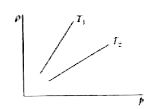
View Solution`P - T` diagram is shown in Fig. Choose the corresponding `V - T` diagram.
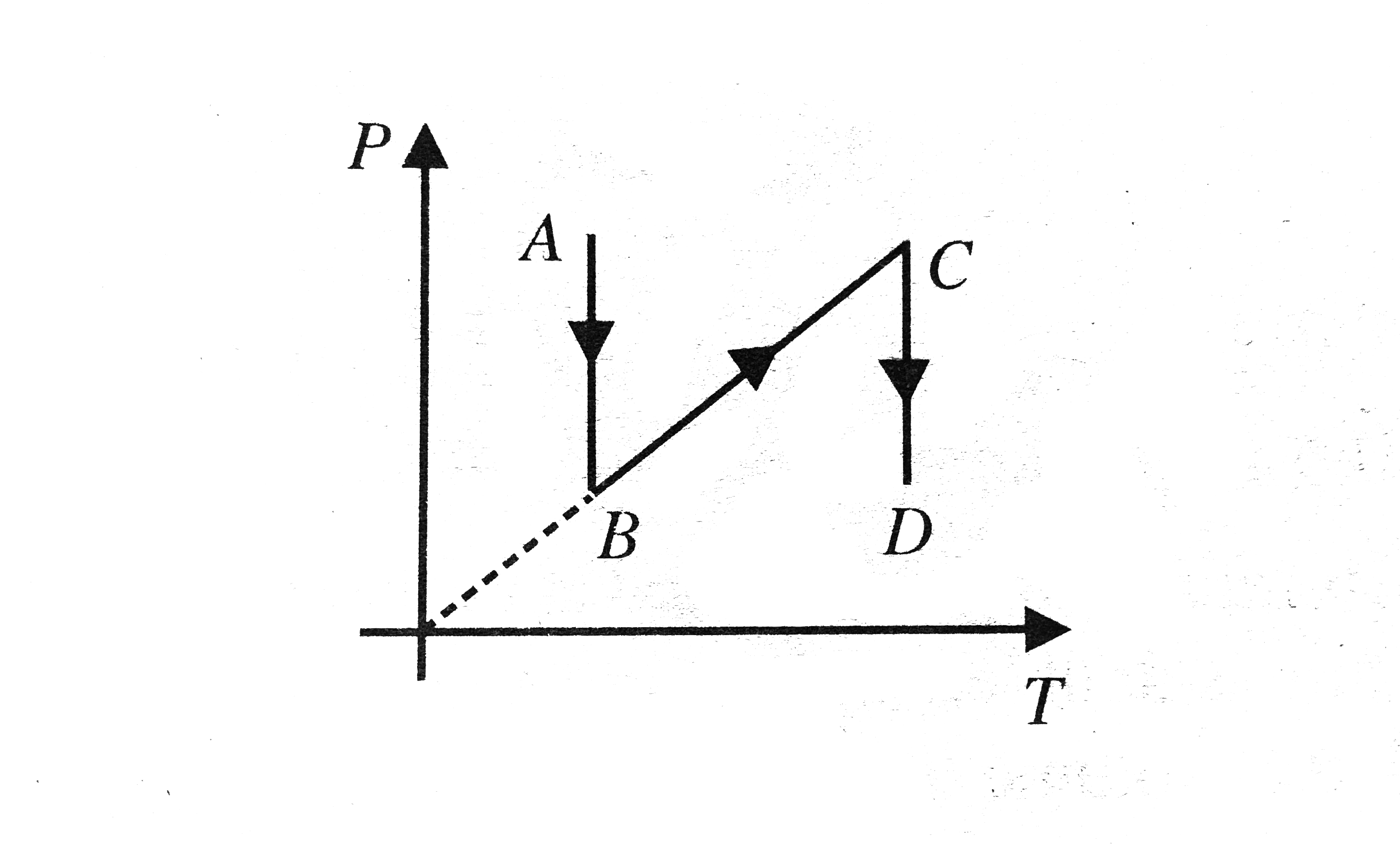
View SolutionA frictionless gas-filled cylinder is fitted with a movable piston, as shown in the figure. The block resting on the top of the piston determines the constant pressure that the gas has. The height his 0.120 m when the temperature is 273 K and increases as the temperature increases. What is the value of h when the temperature reaches 318 K?
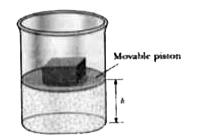
View SolutionA bulb contains 1 mol of hydrogen mixed with one mole of oxygen at temperature T. The ratio of rms values of velocity of hydrogen molecules to that of oxygen molecules is
View SolutionA primitive diving bell consists of a cylindrical tank with one end open and one end closed. The tank is lowered into a freshwater lake, open end downward. Water rises into the tank, compressing the trapped air, whose temperature remains constant during the descent. The tank is brought to a halt when the distance between the surface of the water in the tank and the surface of the lake is 40.0 m. Atmospheric pressure at the surface of the lake is `1.01 xx 10^5` Pa. Find the fraction of the tank's volume that is filled with air.
View SolutionNear the surface of Venus, the rms speed of carbon diox ide molecules (`CO_2`) is 650 m/s. What is the temperature (in kelvins) of the atmosphere at that point?
View SolutionConsider a collision between an oxygen molecule and a hydrogen molecule in a mixture of oxygen and hydrogen kept at room temperature. Which of the following are possible?
View SolutionLet `barv,v_(rms) and v_p` respectively denote the mean speed. Root mean square speed, and most probable speed of the molecules in an ideal monoatomic gas at absolute temperature T. The mass of a molecule is m. Then
View SolutionWhich of the following statements are correct?
View SolutionA box contains a mixture of H, and He gases. Which of the following statements are correct?
View SolutionWhich of the following quantities is the same for all ideal gases at the same temperature?
View SolutionTwo vessels of the same volume and filled with the same gas at the same temperature. If the pressure of the gas in these vessel be in the ratio 1:2, then state : (i) the ratio of the rms speeds of the molecules, (ii) the ratio of the number of molecules.
View SolutionThe total kinetic energy of translational motion of all the molecules of 5 L of nitrogen exerting a pressure P is 3000 J.
View SolutionIf the atoms in a diatomic molecule can vibrate, the molecule has
View SolutionA vessel contains an ideal gas at `27^@ C` and pressure 200 kPa. The volume of the gas is 8.0 L. The molecules of the gas collide with the walls of the vessel and exert a pressure. The gas is allowed to leak till the pressure falls to 150 kPa and the temperature remains the same. The diameter of the ideal gas molecule is 300 pm. The average distance traveled by the molecule between collisions is termed as the mean free path. The mean free path of a gas molecule varies directly proportional to the temperature and inversely proportional to the pressure. Take, R = 8.3 J/mol K and `N_A = 6.02 xx 10^(23)`/mol.
The number of moles of the gas in the vessel before the gas was leaked is
View SolutionA vessel contains an ideal gas at `27^@ C` and pressure 200 kPa. The volume of the gas is 8.0 L. The molecules of the gas collide with the walls of the vessel and exert a pressure. The gas is allowed to leak till the pressure falls to 150 kPa and the temperature remains the same. The diameter of the ideal gas molecule is 300 pm. The average distance traveled by the molecule between collisions is termed as the mean free path. The mean free path of a gas molecule varies directly proportional to the temperature and inversely proportional to the pressure. Take, R = 8.3 J/mol K and `N_A = 6.02 xx 10^(23)`/mol.
The amount of gas leaked is
View SolutionA vessel contains an ideal gas at `27^@ C` and pressure 200 kPa. The volume of the gas is 8.0 L. The molecules of the gas collide with the walls of the vessel and exert a pressure. The gas is allowed to leak till the pressure falls to 150 kPa and the temperature remains the same. The diameter of the ideal gas molecule is 300 pm. The average distance traveled by the molecule between collisions is termed as the mean free path. The mean free path of a gas molecule varies directly proportional to the temperature and inversely proportional to the pressure. Take, R = 8.3 J/mol K and `N_A = 6.02 xx 10^(23)`/mol.
the average translation kinetic energy of the molecules of the gas is
View SolutionX and Y are two equal size containers. X contains a gas A at a temperature `75^@ `C and Y contains a gas B at a temperature `40^@ `C. Each gas behaves as an ideal gas and specific heat at constant pressure for both gases has the same value.
From the given information, we can conclude that
View SolutionX and Y are two equal size containers. X contains a gas A at a temperature `75^@ `C and Y contains a gas B at a temperature `40^@ `C. Each gas behaves as an ideal gas and specific heat at constant pressure for both gases has the same value.
It can be concluded that the
View SolutionX and Y are two equal size containers. X contains a gas A at a temperature `75^@ `C and Y contains a gas B at a temperature `40^@ `C. Each gas behaves as an ideal gas and specific heat at constant pressure for both gases has the same value.
It can be concluded that the
View SolutionMatch the statements in Column I with those in Column II.Any given statement in Column I can have correct matching with one or more statements in Column II.
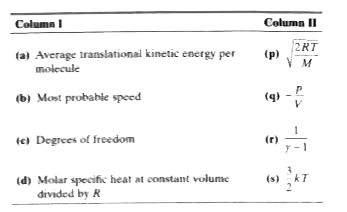
View SolutionIn the question, there is a table having 3 columns and 4 rows. Based on the table, there are 3 questions. Each question has 4 options (a), (b), (c) and (d), ONLY ONE of these four options is correct.
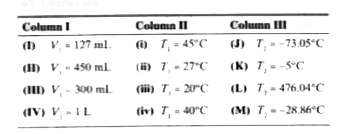
Which combination has 379.28 mL as value for `V_2`?
View SolutionIn the question, there is a table having 3 columns and 4 rows. Based on the table, there are 3 questions. Each question has 4 options (a), (b), (c) and (d), ONLY ONE of these four options is correct.
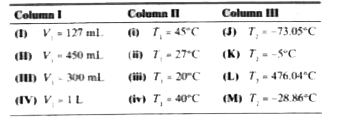
Which combination has 317 mL as value for `V_2`?
View SolutionIn the question, there is a table having 3 columns and 4 rows. Based on the table, there are 3 questions. Each question has 4 options (a), (b), (c) and (d), ONLY ONE of these four options is correct.

Which has combination 250 mL as value for `V_2`?
View SolutionAt what temperature is the rms velocity of a hydrogen molecule equal to that of an oxygen molecule at `47^(@)C`?
View SolutionFind the temperature at which oxygen molecules have the same rms speed as `N_2` molecules at `7^@ `C.
View SolutionNitrogen is in equilibrium state at T=421K .The value of most probable speed,`v_(mp)` is
View SolutionWhat is the degree of freedom of gas? If at STP, the velocity of sound in it is 330 m/s, gas density = 1.3 mg/`cm^3`
View Solution
PRACTICE QUESTIONS questions and complete solutions for chapter THE KINETIC THEORY OF GASES of RESNICK AND HALLIDAY PHYSICS (HINGLISH) of Class 12